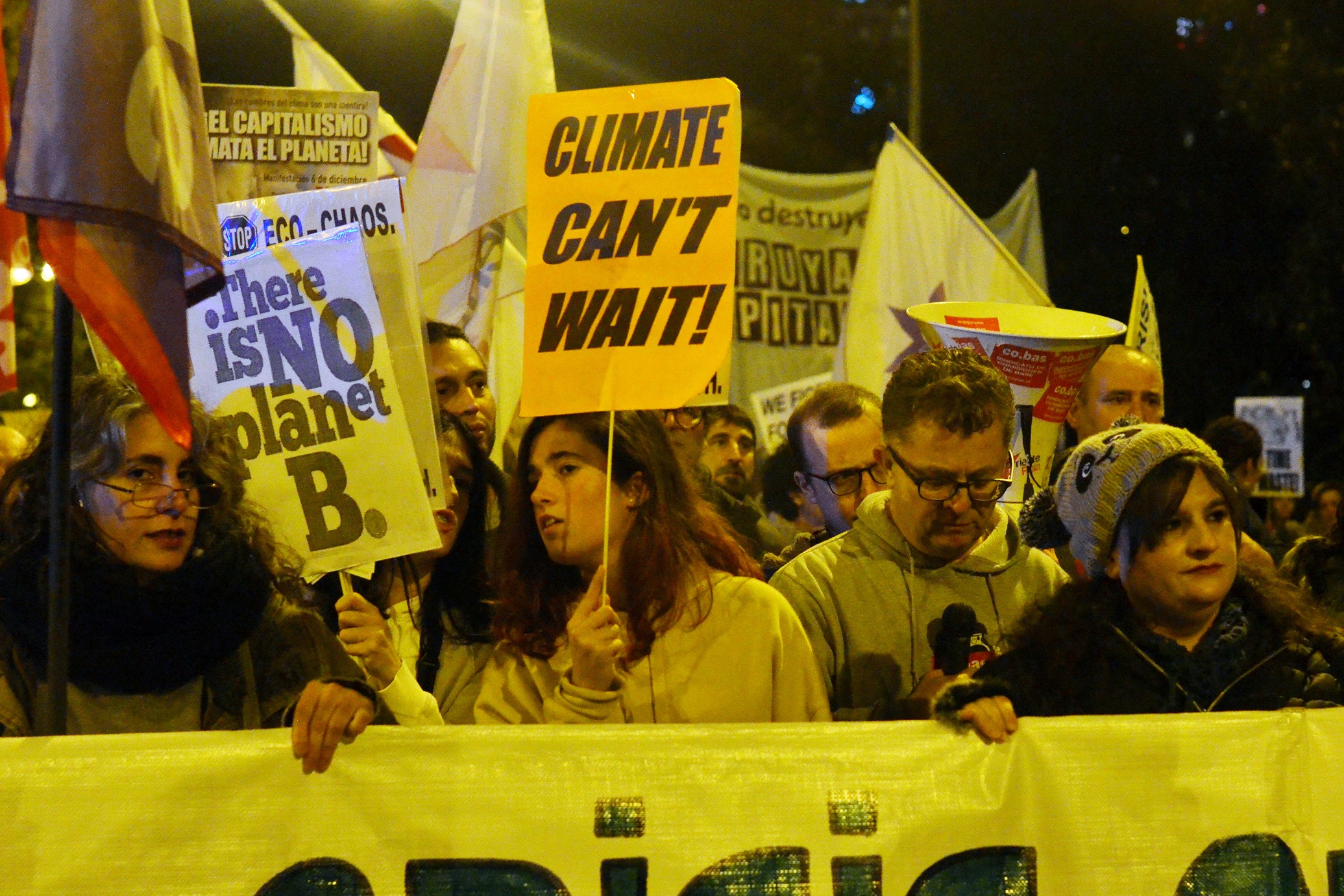Internews’ Earth Journalism Network (EJN) continued its long-running Climate Change Media Partnership (CCMP) program in December by bringing 13 journalist Fellows and four trainers from the developing world to cover the United Nations COP25 Climate Summit held in Madrid. The participants have so far produced nearly 150 stories on a wide range of topics related to climate change and the global treaty negotiations at which countries navigate their commitments to reducing greenhouse gas emissions.
This was a particularly challenging summit for the CCMP due to the last-minute change in venue: The COP was originally scheduled to be held in Santiago, Chile, but had to be relocated due to the ongoing civil unrest there. Like many other organizations, EJN had to quickly make new arrangements for flights and lodging in Madrid, significantly raising costs. We were pleased, however, that we were still able to bring all the Fellows we had selected to Madrid, thanks to generous funding from the European Climate Foundation, the Global Environment Facility, the Climate Justice Resilience Fund and the Swedish International Development Agency.
The CCMP’s first priority is to help reporters from developing countries produce stories for their local media, giving readers in those places – ones often at the greatest risk from climate change – access to negotiations aimed at combating its impacts.
One of the biggest and most contentious points of debate at COP25 was Article 6 of the 2015 Paris climate agreement, which establishes the foundation for market-based climate measures after 2020. Fellows followed these talks closely while also reporting on the many side events and discussions during the intense second week of the summit.
Some of our Fellows, such as reporter Adele Santelli from TV Cultura in Brazil, produced daily coverage of the event, providing viewers with details of the negotiations, outcomes of various high-level meetings and a “special edition” wrap up story that explained the important role the carbon market played in the outcome of the negotiations.
Youth were a big focus of coverage for many of our Fellows, with dozens of stories devoted to the ongoing youth-led climate strikes known as “Fridays for the Future”. The role of women and indigenous groups also factored heavily into Fellows’ reporting. One often overlooked story covered by radio reporter Tunicia Phillips was about a resolution to improve gender inclusivity in climate change-related activities.

As negotiations started coming to a close, the focus of the reporting shifted toward the lack of ambition individual countries were putting toward their climate-reduction targets. Alberto Niquen from Peru reported on how the conference was a “missed opportunity,” with Brazil, Australia and Saudi Arabia, among others, opposing commitments to improve climate action.
Fellows like Mark Oloo from Kenya addressed the absence of U.S. President Donald Trump at the climate change negotiations and opposition to his intention to withdraw from the Paris Agreement later this year.
Many also focused on issues specific to their countries or regions. Indonesian journalist Arif Ahmad from Kompas reported on calls for Indonesia to strengthen its support for climate adaptation, transition from coal to cleaner energy and efforts to restore peatland, one of the biggest sources of that country’s carbon emissions.
Josephine Okojie, writing for Business Day in Nigeria, focused on financing for climate adaptation by looking at how Africa could access more funds to tackle the effects of climate change, while Bangladeshi reporter GM Mostafizul Alam produced a series of television stories on how less-developed, climate vulnerable nations would be impacted by richer ones failing to commit funds toward climate change mitigation.
Writing for Caribbean Insight, Dizzanne Billy focused her coverage on issues most important to small island states, seen as among the most vulnerable to the immediate effects of increasingly severe storms and sea-level rise.
There were also stories that humanized negotiations typically described as contentious or lacking ambition but increasingly seen as urgent due to the pace of global warming. Cuba’s Julio Batista, for example, published a photo essay picturing an average day at COP25, while Shakoor Rather, a Fellow from India who highlighted the country’s positive efforts to reduce greenhouse gas emissions, introduced readers to Licypriya Kangujam, an eight-year-old activist speaking out about the impact of climate change on children in the Global South.
Here are some additional highlights of our Fellows’ coverage:
- Fresh plan to roll out ‘green’ classrooms in every school (Kenya)
- The world prepared for the worst (Indonesia)
- Greta Thunberg and her crusade to be on ‘the right side of history’ (Colombia)
- Reporter’s journal: COP25 puts Paris Agreement at risk of being even more toothless (South Africa)
- Whiff of Delhi’s polluted air in Spain (India)
- In the Peruvian Andes, residents sow water for the future (Peru)
- COP25: A call to scale up climate finance, adaptation action (Philippines)
- Marina Silva: Bolsonaro created ‘an undesirable situation’ for Latin America (Brazil)
- Pacific Island nations at COP25: Leave no one behind (Philippines)
- Ecosystem-based adaptation: Responding to climate change (Peru)
- UN climate summit should focus on achieving goals of Paris deal, says minister (India)
- UN climate summit ends in failure (India)
(Banner photo: COP25 venue. Credit: Allan Jay Quesada)
